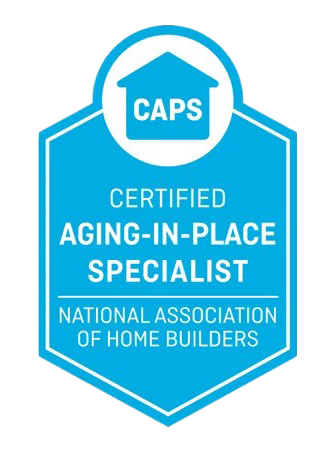Lakeshore Barrier Free is a Certified Aging-in-Place Specialist (CAPS). Aging in place involves making modifications to the home environment to accommodate the evolving needs of seniors. These modifications can range from simple adjustments, such as installing grab bars in the bathroom or improving lighting, to more extensive renovations, such as adding wheelchair ramps or stairlifts. The goal is to create a space that promotes safety, accessibility, and convenience, allowing seniors to continue living independently for as long as possible.
AGING IN PLACE RESOUrces
Aging in place is not just a concept; it's a philosophy that empowers individuals to maintain their independence and autonomy as they grow older. It's about creating an environment where seniors can continue to live in their own homes safely, comfortably, and with dignity, regardless of age or physical ability. At its core, aging in place emphasizes the importance of adapting living spaces to meet changing needs rather than relocating to assisted living facilities or nursing homes.

WHAT ARE THE BENEFITS OF AGING IN PLACE?
- Preservation of Independence
One of the most significant benefits of aging in place is the preservation of independence. By remaining in familiar surroundings, seniors can maintain a sense of control over their lives and routines, which can contribute to overall well-being and quality of life. - Emotional Well-being
Moving to a new environment, such as an assisted living facility, can be emotionally challenging for seniors. Aging in place allows individuals to stay connected to their community, friends, and neighbors, reducing feelings of isolation and loneliness. - Familiarity and Comfort
Home is more than just a physical space; it's a place filled with memories, comfort, and familiarity. Aging in place allows seniors to remain in a space where they feel most comfortable and at ease, surrounded by cherished belongings and familiar surroundings. - Cost-Effectiveness
In many cases, aging in place can be more cost-effective than moving to a senior living facility. While there may be upfront costs associated with home modifications, they are often significantly lower than the ongoing expenses of assisted living or nursing home care. - Personalized Care and Support
Aging in place enables seniors to receive personalized care and support tailored to their individual needs. Whether through in-home caregivers, medical alert systems, or community services, seniors can access the assistance they need while maintaining their independence. - Promotion of Health and Wellness
By staying in their own homes, seniors can continue to engage in familiar routines and activities that promote physical and mental health. Access to outdoor spaces, social interactions, and recreational activities can contribute to overall well-being and longevity. - Family Involvement and Support
Aging in place often involves the support and involvement of family members, who can provide assistance with daily tasks, medical care, and emotional support. This arrangement allows families to remain closely connected and involved in their loved one's care.
WHO CAN BENEFIT FROM AGING IN PLACE?
Aging in place can benefit a wide range of individuals, including seniors themselves, their families, and communities. For seniors, aging in place provides the opportunity to maintain independence, dignity, and a sense of control over their lives as they age. It allows them to remain in familiar surroundings, close to friends, family, and the community networks they've built over the years. Additionally, aging in place can lead to better physical and mental health outcomes by reducing the stress and disruption associated with moving to a new environment. Families also benefit from aging in place by knowing their loved ones are comfortable and well-supported, while communities benefit from the continued presence and contributions of older adults, fostering intergenerational connections and a sense of cohesion. Overall, aging in place promotes the well-being and resilience of individuals, families, and communities alike.
IS AGING IN PLACE ONLY FOR THE ELDERLY?
While aging in place is often associated with the elderly, it's not exclusively for this demographic. The principles of aging in place can apply to anyone who desires to remain in their own home or community as they age, regardless of age or ability. For instance, individuals with disabilities or chronic health conditions may also benefit from aging in place by receiving the necessary support and accommodations to maintain their independence and quality of life. Moreover, the concept extends beyond physical age, encompassing factors like lifestyle preferences, cultural background, and personal circumstances. Ultimately, aging in place is about empowering individuals to live comfortably and autonomously in environments that suit their needs and preferences, regardless of their chronological age.
Additional resources and information can be found on the websites:
• National Institute on Aging (www.nia.nih.gov/health/aging-place/aging-place-growing-older-home)
• National Association of Home Builders (www.nahb.org/education-and-events/education/designations/certified-aging-in-place-specialist-caps).
Aging in place is not just about staying in one's home; it's about maintaining independence, dignity, and quality of life as one grows older. By adapting living spaces to meet changing needs and leveraging support services and resources, seniors can continue to thrive in the comfort and familiarity of their own homes. Embracing the principles of aging in place can lead to a fulfilling and rewarding experience for seniors and their families alike.
MICHIGAN RESOURCES AND SUPPORT FOR AGING IN PLACE
Below are resources and programs to support aging in place, ensuring seniors can live independently and comfortably in their own homes for as long as possible.
01
Disability Advocates of Kent county
Through advocacy, education, and support services, Disability Advocates of Kent County work to promote equality, accessibility, and inclusion for people with disabilities in all aspects of life. Their mission is to ensure that individuals with disabilities have the resources and opportunities needed to live independently and participate fully in their communities. Visit Website: Disability Advocates
02
Michigan Aging and Adult Services Agency (AASA)
AASA oversees programs and initiatives aimed at supporting older adults and individuals with disabilities in Michigan. They provide information on available services, advocacy, and resources for seniors and their families.
03
Michigan Medicaid Waiver Programs
Michigan offers several Medicaid waiver programs that provide home and community-based services to eligible seniors. These programs cover a range of services, including personal care, homemaker services, respite care, and home modifications. www.michigan.gov/mdhhs/assistance-programs/medicaid/portalhome/beneficiaries/programs/progbens/mi-choice-waiver-program
04
Newago Commission on aging
Newaygo County Commission on Aging exists to make available caring services that enhance the quality of life and support the independence of adults who are 60 and over. https://www.newaygocountymi.gov/departments/commission-on-aging/commission-on-aging/
05
Michigan State Housing Development Authority (MSHDA)
MSHDA offers programs and resources to help seniors with affordable housing options, home repair assistance, and accessibility modifications. These programs aim to ensure that seniors can age in place safely and comfortably in their own homes. www.michigan.gov/mshda
06
Veterans Affairs (VA) Benefits
Veterans in Michigan may be eligible for a range of benefits and services through the U.S. Department of Veterans Affairs. These benefits may include home healthcare services, home modifications, and assistance with activities of daily living. www.michigan.gov/mvaa
For additional information and resources, visit www.michigan.gov/mdhhs/adult-child-serv/adults-and-seniors/behavioral-and-physical-health-and-aging-services
CONTACT LBF for Barrier-free living
At Lakeshore Barrier Free, we strive to create welcoming, accessible, and functional living environments for everyone.

CONTACT LBF for Barrier-free living
At Lakeshore Barrier Free, we strive to create welcoming, accessible, and functional living environments for everyone.



Navigation
Services
All Rights Reserved | Lakeshore Barrier Free
Website by SPECK DESIGNS
All Rights Reserved | Lakeshore Barrier Free
Website by SPECK DESIGNS
